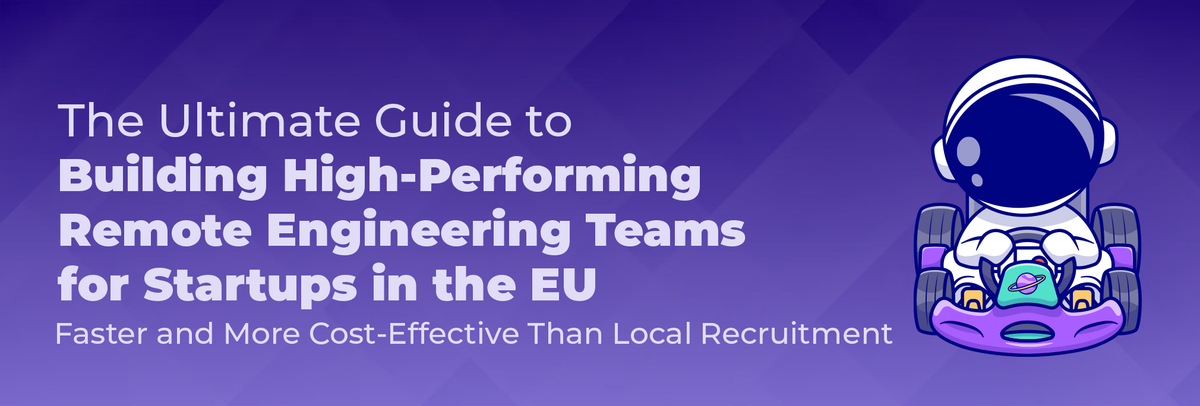The Ultimate Guide to Building High-Performing Remote Engineering Teams for Startups in the EU: Faster and More Cost-Effective Than Local Recruitment

Welcome to "The Ultimate Guide to Building High-Performing Remote Engineering Teams for Startups in the EU."
In today's digital age, remote work has become increasingly prevalent, offering startups a faster and more cost-effective solution than traditional local recruitment.
With 86% of engineers now embracing remote software engineer jobs, this guide provides essential insights and strategies to navigate the nuances of remote team building.
From leveraging digital collaboration tools to fostering effective communication, discover how to assemble and manage top-tier engineering talent regardless of geographical boundaries.
Harness the power of remote work to propel your startup towards success in the European market.
How To Build High-Performing Remote Engineering Teams For Startups in the EU
Building high-performing teams for EU startups requires strategic planning and effective execution.
In this section, we outline key strategies to navigate the challenges and leverage the advantages of a remote workforce in engineering.
- Commence with a Well-Defined Plan
Avoid simply assembling a group of skilled individuals and anticipating exceptional outcomes.
Ensure mutual understanding by establishing precise objectives and requirements for each team member.
This ensures that everyone comprehends the definition of success and comprehends how their efforts contribute to the overall objectives.
Conduct collaborative sessions to elucidate the definition of "success" for your remote team.
Could it involve achieving particular sales milestones? Concluding projects promptly and within budget constraints?
Articulate these objectives distinctly, then translate them into personalized objectives for each team member.
Regular follow-ups can verify that everyone is in sync and progress toward the collective goals.
- Leverage Digital Platforms for Communication and Collaboration
Utilizing digital tools such as Slack, Zoom, Asana, or Trello facilitates efficient communication and collaboration among virtual teams.
By leveraging these platforms, startups can overcome geographical barriers, enabling real-time discussions, file sharing, and project tracking.
Explore various communication avenues – some colleagues may prefer brief updates via Slack, while others may prefer in-depth discussions during video conferences.
The crux lies in discovering a communication approach that accommodates everyone's preferences and fosters an atmosphere of open discourse.
Did you know that approximately 51% of managers overseeing remote teams advocate for asynchronous communication methods?
Strategies to ensure transparency and accountability, such as setting clear expectations for response times and task updates, are paramount.
Regular check-ins and status updates via these digital platforms help keep the team connected and informed, fostering a sense of unity despite physical distance.
Moreover, the documentation of communication and collaboration activities provides valuable insights for future reference and continuous improvement.
- Hire Remote-Friendly Talent
Identifying candidates with a proven track record of success in remote work environments is essential for building effective remote engineering teams.
Beyond technical skills, candidates should possess qualities like self-discipline, autonomy, and effective communication skills.
Assessing cultural fit involves evaluating candidates' ability to thrive in a remote work setting, emphasizing traits such as adaptability, resilience, and collaboration.
Streamlining the remote hiring process involves leveraging technology for remote interviews, assessments, and onboarding procedures.
By prioritizing remote-friendly talent acquisition, startups can ensure a seamless integration process and mitigate potential challenges associated with remote management of teams.
- Utilize Empowering Technology
Provide your team with the essential resources to thrive.
This could entail providing high-speed internet access, ergonomic workstations, and job-specific software. Investing in these essentials is crucial, as a content and well-equipped team is inherently more productive.
Consider procuring ergonomic chairs, noise-canceling headphones, and additional monitors as required.
Establish a transparent policy regarding reimbursement for these vital tools.
Extend your considerations beyond the fundamentals – explore project management platforms facilitating seamless teamwork, secure cloud storage options for effortless file exchange, and even design software conducive to remote brainstorming sessions.
- Implement Agile Methodologies
Agile methodologies provide a framework for managing projects iteratively and adaptively, making them well-suited for remote engineering teams.
By embracing agile development principles such as iterative development, continuous feedback, and regular retrospectives, virtual teams can maintain productivity and responsiveness in a remote environment.
Effective communication and collaboration tools are essential for facilitating agile ceremonies such as daily stand-ups, sprint planning, and sprint reviews.
Emphasizing transparency and visibility of project progress ensures alignment and accountability across remote team members.
Additionally, adapting agile development practices to accommodate remote work challenges, such as time zone differences and communication barriers, is key to maximizing the benefits of agile methodologies in a distributed team setting.
Point to Ponder: The agile methodology led to revenue growth and profit increases for 60% of companies.
- Embrace Diversity and Inclusivity
Recognizing the importance of diversity and inclusivity fosters innovation, creativity, and resilience within remote engineering teams.
Embracing diverse perspectives, backgrounds, and experiences enriches problem-solving processes and drives better decision-making outcomes.
Implementing strategies to foster inclusivity involves creating an environment where all team members feel valued, respected, and empowered to contribute.
This may include promoting open communication channels, establishing inclusive meeting practices, and addressing unconscious biases.
Cultivating a supportive culture that celebrates diversity and promotes equity ensures that every team member can thrive and reach their full potential, regardless of their background or identity.
Here are some of the stats to look out for to understand why DEI is important for your organization:
- Diversity, Equity, and Inclusion (DEI) initiatives contribute to higher employee engagement, as well as increased productivity and retention rates. (Source: Deloitte)
- A significant majority, comprising 89% of individuals, express a desire for their company to embrace inclusivity by accommodating individuals with intellectual disabilities. (Source: Clear Company)
- Leadership teams characterized by diversity yield a 19% increase in revenue. (Source: BCG)
Empower Your Remote Engineering Teams With Teamo
With Teamo's superteam of 10x Talent, startups can access top-tier, pre-screened software developers from emerging markets.
Here are some of the features of Teamo you need to look out for:
- Seamless Integration: Effortlessly integrate top-tier software developers from emerging markets into your development team.
- Fast and Affordable: Access high-caliber talent quickly and cost-effectively, without the delays and expenses associated with traditional local recruitment.
- Extensively Vetted: Benefit from a rigorous vetting process that ensures the quality and reliability of Teamo's remote professionals, saving you time and resources.
FAQs
- What are the benefits of building remote engineering high-performing teams for EU startups?
Remote engineering teams offer EU startups numerous advantages, including:
- Access to a global talent pool
Remote work allows startups to recruit top-tier talent from diverse geographical locations.
- Cost-effectiveness
Remote teams eliminate the need for expensive office space and overhead costs associated with local recruitment.
Studies indicate that employers can achieve savings of $11,000 per employee through the transition to remote work.
- Flexibility
Remote work offers flexibility for both employees and employers, enabling better work-life balance and accommodating diverse schedules.
Among those who have engaged in remote work, 54% highlight flexibility in scheduling and location choice as the most advantageous aspects of remote work.
- Enhanced productivity
Studies have shown that remote workers are often more productive due to fewer distractions and the ability to work in environments conducive to focus.
For instance, a significant majority of employed individuals, accounting for 77%, report higher productivity levels when working remotely compared to the traditional office setting.
Specifically, 80% of individuals belonging to Generation Z and Generation X, along with 76% of millennials, express increased productivity when working from home as opposed to the office environment.
As per the Remote Workforce Report, 40% of decision-makers within fully remote companies regard heightened productivity as a significant advantage of distributed remote work.
Moreover, 72% of remote employees collaborating within globally distributed teams affirm experiencing increased productivity.
- How do you manage remote teams and outsourced resources?
- Establish clear communication channels using various tools like video conferencing and project management platforms.
- Set clear expectations regarding project objectives, timelines, and deliverables.
- Implement agile project management methodologies to manage projects iteratively and adaptively.
- Foster trust and accountability within remote team dynamics by encouraging open communication and transparency.
- Provide adequate support, resources, and training to remote teams and outsourced resources.
- Monitor performance and progress using key performance indicators (KPIs) and metrics.
- Celebrate successes and learn from challenges to continuously improve collaboration and project outcomes.
- What is an engineering team?
An engineering team within a company consists of various roles that complement each other and work closely together during the production process.
A successful engineering team typically comprises developers, managers, team leads, and quality assurance specialists, all collaborating harmoniously to achieve project objectives.




